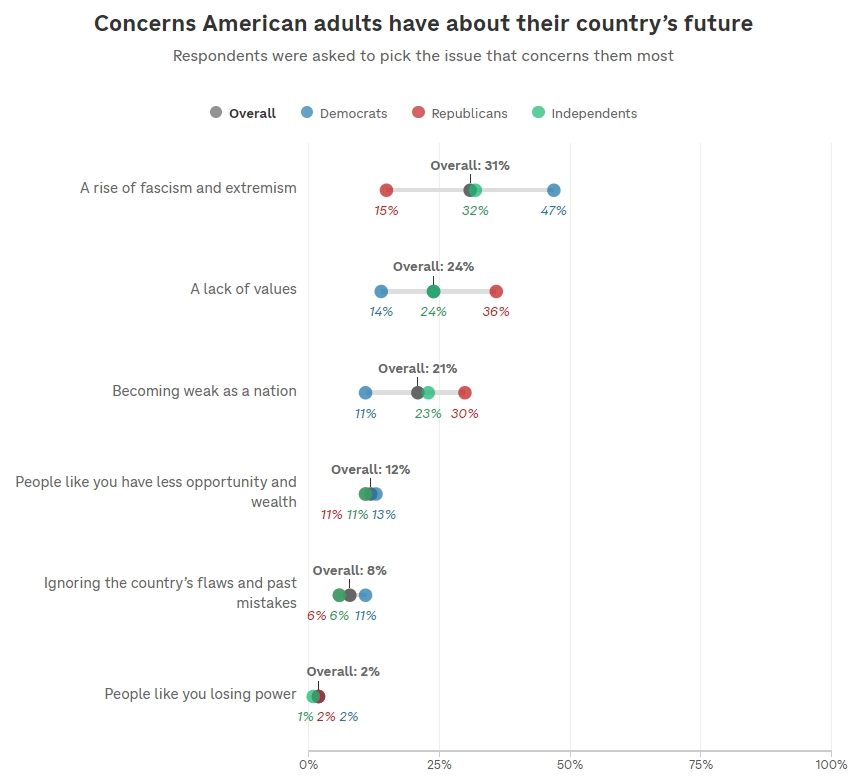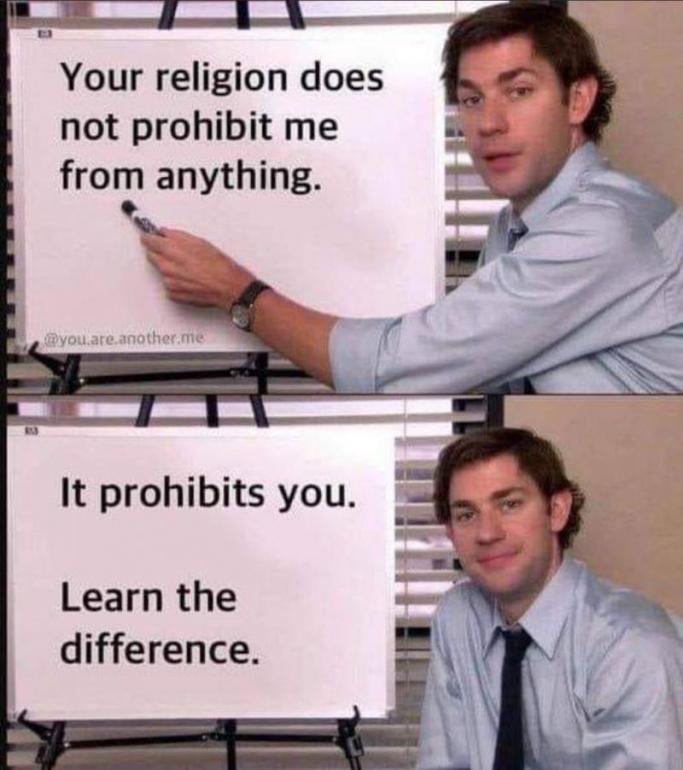This question has been on my mind for ~20 years. I don't recall writing about it, but it usually lurks in the background of my conscious mind. This question and what I found over many years directly led me to the idea of an anti-ideology ideology for politics. I call it pragmatic rationalism, (PR) which I usually referred to in blog posts as being grounded in morals.
Others have come to a similar mindset, so I'm not unique.
The big problem with PR that probably forever dooms it to political insignificance is the vast differences that people have when it comes to most moral values or principles. Reality is often at odds with professed beliefs and values. My search for an ideology that seemed reasonable at least in theory had to deal with the constant plague on mankind called
essentially contested concepts (ECCs). In short, ECCs refer to concepts that people agree about in general, but can never agree on in particulars. Wikipedia describes the ECC plague like this:
Essentially contested concepts involve widespread agreement on a concept (e.g., "fairness"), but not on the best realization thereof. They are "concepts the proper use of which inevitably involves endless disputes about their proper uses on the part of their users", and these disputes "cannot be settled by appeal to empirical evidence, linguistic usage, or the canons of logic alone."
Conceptual confusion in the social sciences—and certainly in political science—is a major source of difficulty in both theory and empirical analysis. The literature is replete with concepts that are applied inconsistently. This in turn influences the coherence of research and the cumulation of findings in the study of politics. .... On one level, these problems may be seen as deriving from a straightforward failure to specify the relationship between ‘term’ and ‘meaning’, involving confusion about concepts. Scholars are sometimes inconsistent in their own usage, or they simply fail to grasp the definitions employed by other researchers.
ECCs include most or nearly all moral values or principles. Most key morals or principles in politics appear to be ECCs. Examples include democracy, justice, rule of law, citizenship, war, genocide, abortion, freedom, equality, free speech, hate speech, honesty, dishonesty, ethical, unethical, constitutional, transparency, opacity, truth, lies, rationality, the public interest (or general welfare) and so on. Although moral values are generally internally consistent, political values are often inconsistent (hypocritical?) because politicians adjust their positions for strategic or self-interested reasons. In my mind, moral values are more important than political values, but our corrupted pay-to-play two party political system does not operate that way.
All of that suggests that moral superiority in politics is an ECC or a meaningless concept. From that point of view, one simply stops thinking about political morals or principles. One just fights it out, regardless of hypocrisy or irrationality in words and deeds used in the fight. Most political advocates and pundits, especially radicals, ideologues, kleptocrats and authoritarians usually (~97% of the time?) claim moral superiority, but that is just a smoke screen for their agendas. The main agendas are usually (~95% of the time?) getting more wealth and/or power, usually more of both. They usually do not care much about moral vales when they are inconvenient.
Despite the plague of ECCs and how our political system really works, one can argue that there is an at least partly objective basis to assign moral superiority to words and deeds. Morally superior is basically what PR is designed to be. How can moral superiority be possible in the face of ECCs and corrupted politics? It is possible to see moral differences in individuals and groups by looking at what people say they believe in and how they act.
For example, most American radical right authoritarian elites and rank and file say they are fighting for democracy, truth, the rule of law and equal justice, based on facts and sound reasoning. Every one of those moral values is an ECC, including the concept of a fact. But how well do their actions accord with their self-professed political principles or moral values? When Republican Party elites and most of the rank and file claim the 2020 election was stolen and the 1/6 coup attempt was "
legitimate political discourse", how well does that synch up with defending democracy, truth, the rule of law and equal justice, based on facts and sound reasoning? In my opinion, not very well. In fact, not at all.
Is it fair and rational to look at disconnects between openly professed moral values and how well actions align with those morals? It seems fair to me. After all, those who claim to support democracy and the rule of law but actually intend to destroy it are far from consistent. Why can't one judge them? They exert power over everyone based on their self-professed moral values. They claim what they want and do is in the best interest of everyone. But what they do usually directly contradicts the moral values they claim authority to stand on.
And what about those deceived among the rank and file? They sincerely believe that they are fighting for democracy, truth, the rule of law and equal justice, based on facts and sound reasoning. In fact, they fight for the opposite based mostly on lies and crackpottery. They are sucked in by irrational crackpottery like "you have to destroy it before you can fix it", and lies like "the 2020 election was stolen" and other authoritarian propaganda. Are they morally blameless in this? Does being deceived absolve one of moral sin? Do adults have no responsibility for their political actions because they are deceived? If not, then exactly what absolves the millions of the deceived that drives the authoritarian wealth and power movement? Fear or bigotry fomented by propaganda?
In my opinion, there is such a thing as moral superiority in politics. There is moral culpability for political actions, whether they are grounded in deceit and/or ignorance. Essentially all of the authoritarian elites know exactly what they are doing. There are very few deceived in that group. They want some form of kleptocratic authoritarianism, but they rely heavily on false claims of love and respect for democracy, the rule of law and etc.
Qs: Is moral superiority[1] in politics a meaningful concept, if one puts heavy weight on respect for facts, true truths and sound reasoning, convenient or not? What if one puts heavy weight on respect for facts, true truths, sound reasoning and belief in democracy (e.g., reasonable compromise) over authoritarianism (e.g., no compromise)?
Footnote:
1. Some researchers believe that belief in personal moral superiority, which most people have, is a powerful illusion.
A 2016 research paper comments:
Most people strongly believe they are just, virtuous, and moral; yet regard the average person as distinctly less so. This invites accusations of irrationality in moral judgment and perception—but direct evidence of irrationality is absent. Here, we quantify this irrationality and compare it against the irrationality in other domains of positive self-evaluation. Participants (N = 270) judged themselves and the average person on traits reflecting the core dimensions of social perception: morality, agency, and sociability. Adapting new methods, we reveal that virtually all individuals irrationally inflated their moral qualities, and the absolute and relative magnitude of this irrationality was greater than that in the other domains of positive self-evaluation. Inconsistent with prevailing theories of overly positive self-belief, irrational moral superiority was not associated with self-esteem. Taken together, these findings suggest that moral superiority is a uniquely strong and prevalent form of “positive illusion,” but the underlying function remains unknown.
Most people believe they are just, virtuous, and moral. These beliefs demand scientific attention for several reasons. For one, in contrast to other domains of positive self-belief, they likely contribute to the severity of human conflict. When opposing sides are convinced of their own righteousness, escalation of violence is more probable, and the odds of resolution are ominously low (Pinker, 2011; Skitka, Bauman, & Sargis, 2005). .... Such is the extent of this phenomenon that violent criminals consider themselves more moral than law-abiding citizens living in the community (Sedikides, Meek, Alicke, & Taylor, 2014).
The point being that the concept of belief in moral superiority is accepted in science, but it is plagued by subjectivity and ECCs. The question I pose here asks if persons and groups in politics can be reasonably judged from an at least partly objective point of view, i.e., respect for facts, true truths, sound reasoning and belief in democracy over authoritarianism.





